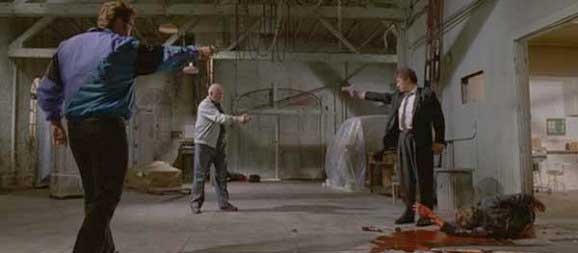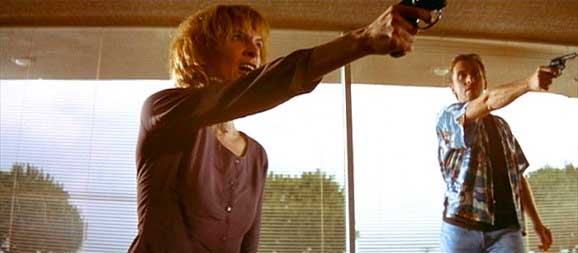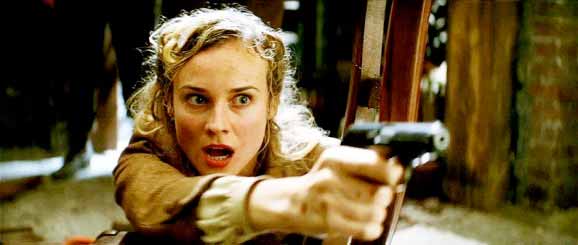Tarantino 20 Years: How This Rebel on the Backlot Helped Shape Today’s Motion Pictures
With Django Unchained being released in the next month, and everyone and their mothers celebrating the filmmakers 20th year making motion pictures, I figured it was time to take a real hard look at how this rebel on the backlot has influenced modern cinema, and how he has denied his own cliche proving, that despite his statements of early retirement, his legacy here to stay.
It began in 1992, when Reservoir Dogs premiered at the Sundance Film Festival. It is a milestone for independent film making. A list actors didn’t sign on to do independent films, and indie directors didn’t upstream to the studio system. Reservoir Dogs changed that with its both critical and public appeal. Empire called it the “greatest independent film of all time”. The little film that could grossed two fold its budget, and inspired a host of other filmmakers to do the same. In terms of how the industry works, Reservoir Dogs made sure that these small pictures could run with the big boys. After Reservoir Dogs had made its rounds, Tarantino was offered both Speed and Men in Black. The director obviously declined, but we see this behavior all the time now. Marc Webb hit it big with 500 Days of Summer and was then handed The Amazing Spiderman. This is how the industry works now, studio execs find some young filmmaker who is fresh off his first or second feature and hand him a script to their blockbusters.
While Reservoir Dogs took Tarantino‘s directorial virginity, it in turn violated a number of viewers. Violence and language were a huge controversy working against the film. People walked out of the theater including special effects artist Rick Baker (who later told Tarantino to take it as a compliment). While the number of profanities barely reaches the record set by previous films, the violence was another story. If you actually watch the film it’s not that gory, but it is pretty real. If there’s one movie I don’t want to be shot in, it’s Reservoir Dogs. The post credits scene of Tim Roth bleeding like a stuffed pig in the back seat of a car and the infamous ear-torture scene haunt the audience. Their success at disturbing us may come from how nonchalantly Tarantino handles violence. He expects this from his stories, we’ve been conditioned not to expect it from film. ‘Stuck in the Middle With You’ plays as Michael Madsen cuts the ear off of a kidnapped police officer. Normally we may get an unnerving string accompaniment in another film, but in Tarantino‘s world we get whatever happens to be on the radio. It just happens to be The Super Sounds of the 70s Weekend.

Reservoir Dogs also does something probably never or at least hardly done in cinema before, the inclusion of pop culture in the dialogue. I mean why couldn’t anyone just talk about anything in film. While the subtext isn’t there, Hollywood realized that they could talk about themselves in their own creations. How many comedy’s now feature Jonah Hill or some other actor comparing a situation to another film. Maybe it’s old hat by now just making references but Tarantino started this trend, he also perfected it. His characters never stop talking, taking the “less is more” motto and ignoring it completely. While his movies might not be specifically about movies, characters talk an awful lot about them. They chat about music, and television and actors. How many times now in a comedy does a cameo of a celebrity appear of him playing himself. Jonah Hill in Superbad compares the dreamy eyes of a fellow student to the first time he heard The Beatles. Tell me that ain’t a Quientinism. The last thing Reservoir Dogs made cool again is the Mexican stand off. Through the entire film I think it happens maybe 4 times but it’s always pretty exciting. Since then lesser crime films like Takers have tried to emulate the stance only flopping. It takes a great build to make that finale really explode.
With Tarantino‘s second picture Pulp Fiction, he had not only perfected his craft but also flipped it on it’s head. The violence once so disturbing in Reservoir Dogs is now drawing a fine line between horror and humor. Does that sound familiar, violence being humor. Arguably this is just hyper slap stick, but violence teetering toward humor is a common use in cinema now. Remember 21 Jump Street and that final scene where the bad guy loses his cock, how fucking funny was that, but like it was his penis that got lobbed off. Now flashback to 94′ when Jules hits a speed bump and Vincent shoots Marvin in the face. Bits of brain are stuck in Jules afro and the two hitmen are pissed not because they killed the kid, but because they gotta pick the brains out of the backseat. This time his characters are still yappin‘ away but the arch of Vincent Vega and Mia Wallace, proves that Tarantino knows when to shut the fuck up. The profanity is increased (this time shattering records) and everyone is still talkin‘ about movies and television, but he also proves how good his ear is with Jules final monologue. Pulp Fiction furthers Hollywood’s trust toward the indie flick. The picture grossed over 200 million dollars worldwide, it shows the damage a strong independent film can do.

Pulp Fiction’s most important contribution to film is perhaps within the nonlinear fashion that its story is told. It’s been done in a similar fashion before (Rashomon, Sunset Boulevard) and flashbacks were always a trade of storytelling (Citizen Kane) but Tarantino made it hip. How many god damn movies start off with the ending first and have you wondering how the character got there; Pans Labyrinth, Melancholia, and how many oddly structured films have been birthed since. Memento is one that comes to mind, it’s more compelling for the audience. The technique of titling chapters of a film like a book has been used in the film Bellflower. The reason this works so well is that it engages the audience, some may say you never want the audience asking questions, but if you start your film off with your main character bloody and beaten in the middle of a deserted road it begs a response from the audience. Melancholia uses it to do the exact opposite. Instead of having the audience ask a question, it answers everyone’s within the first 5 minutes. It’s not a film about a planet colliding with another planet. It’s much deeper than that.
While as much as I hate to skip of Tarantino’s most overlooked film Jackie Brown, it’s impact is lesser felt than the ripples that Kill Bill and Inglourious Basterds set in motion. With his dialogue perfected and much of Kill Bill being a story inspired by romance, subtext in his dialogue is at an all time high. When Bill lectures Beatrix about Superman he’s really talking about her own denial of identity. Kill Bill wasn’t the first of his films to use the reference but it’s the first to use it in abundance. Literally every shot is an homage to some form of Asian cinema. From something as obvious as The Bride’s Game of Death jump suit, to the shot of an aeroplane landing in Tokyo that overlooks the same section of city that the films production designer used on a previous Godzilla film, Tarantino is relentless with the reference. Now look at a film like Paul or Cabin in the Woods, it tries to do the same sort of thing. The execution isn’t as seamless, but the message of love is still gotten across.
In Inglourious Basterds the same thing goes for the characters in the pub scene, a game testing ones knowledge of pop culture leads to a conversation about American slavery, the mirror of Nazism in Germany, a message that every country has its demons to sweep under the rug. Here is where I think film will be lead next. Subtext, yet has any other filmmaker perfected this art like Tarantino, the discussions on pop culture are entertaining but here they are both a symphony to the ears and also stimulant for the mind. His men on a mission film breaks every rule imaginable, which is possibly why it’s gotten such mixed reviews. Music cuts abruptly and practices in information communication (the arrows in the theater shot) are conventions introduced also abruptly, and intentional gaps in storytelling appear (Shosanna’s whereabouts after the massacre of her family). Hell the title of the film is even spelt incorrectly. And who could leave out the complete ignorance of history, though justified as Tarantino explains that his characters don’t know history, they’re living it. Can you imagine what kind of historical pieces we may see in the near future. There isn’t a film maker yet ballsy enough or at least allowed to jump the same gaps as he did.

In conclusion, Tarantino has continually given birth to trends and then avoided from being snagged up in them as they roll by. He still bleeds though, he’s had his own trouble with his self proclaimed worst film Deathproof. A picture that failed to start the trend of exploitation cinema and possibly nearly killed its widespread appeal. Robert Rodriguez and him did start their own trend of grindhouse underground films though with many of the faux trailers that were screened before the films being developed into features after the release of the film; Hobo with a Shotgun, Hellride, loads of genre film makers took the advantage to make some pretty groovy independent exploitation pictures. In the underground, Grindhouse is hot, guess it wasn’t a total failure. It doesn’t really matter that the grindhouse experiment was a failure, it was a pretty gutsy move.
What do you think? Leave a comment.











I like this, it’s a solid overview. I also love it when an article brings other films into the equation – excellent shout-out for Melancholia too. I’d very much like to see more about QT on the site with Django Unchained on the way. I may take it up myself. Good stuff man!
Inglorious Basterds had me right up to the end. I have never liked anachronistic music in period films. (The Sting being one of the few exceptions-Joplin ragtime was 30 years earlier than the films timeframe) and hearing the modern music in such an otherwise great moment of a great film really bugged be. Not as much as the stupid jazz noodling in butch cassidy & the sundance kid, but close.
Thanks for not bashing Deathproof too much and instead presenting what it gave to the industry.
I actually really really like ‘Deathproof’ but this article isn’t about my opinion.
Deathproof is my favorite of the two Grinhouse flicks, although I am in the majority of people that I know.
Yeah I definitely prefer Deathproof over Planet Terror. I agree with Tarantino though, it’s his worst movie but by no means is it bad. Just compared to his other films, which I think are pretty much masterpieces, it’s not up to par.
I enjoyed this article a lot! I’ve seen the films, but hadn’t really thought much about how the larger scale impact they’ve had; it’s good food for thought.
One underrated consequence: Tarantino’s success seems to have made the climb for talent more formulaic.